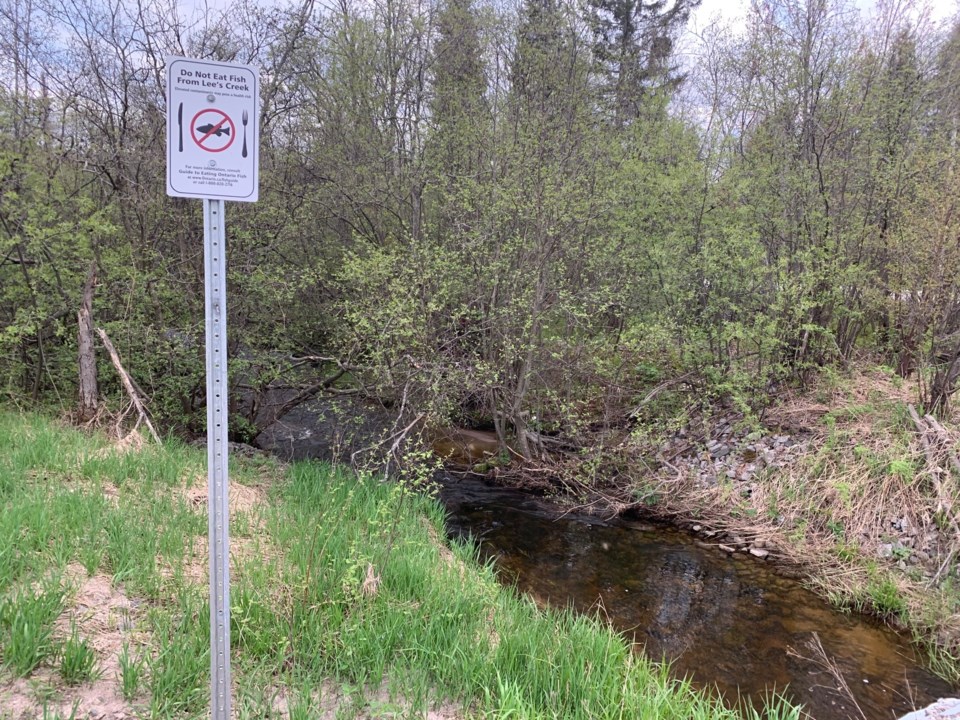Work is starting to eliminate a problem with a "forever chemical" that has plagued a creek that leads to Trout Lake, the source of North Bay's drinking water.
In a news release this week, the City of North Bay says it is planning to initiate "on-site remediation of PFAS (per- and polyfluoroalkyl substances) at the Jack Garland Airport lands as early as this spring."
The problem was discovered back in 2017 when the Department of National Defence admitted that Perfluoralkylated substances (PFAS) had been detected in Trout Lake, Lee’s Creek, North Bay Jack Garland Airport, the Canadian Forces Base (CFB) North Bay, and monitoring wells located near CFB North Bay.
PFAS are man-made substances found in a variety of consumer and industrial products such as adhesives, cosmetics, cleaning products, and in specialized chemical applications, such as fire-fighting foams. They're known as "forever chemicals," because they don't break down in the environment or in humans.
The PFAS are suspected to have come from the CFB North Bay/Airport area, from fire-fighting foam used in the past to fight fires and to train firefighters.
At the time DND issued a statement, "From the early 1970s to the mid-1990s, the Department of National Defence (DND) used extinguishing substances containing Perfluoroalkylated substances (PFAS) at former firefighting training areas at the North Bay Airport. These activities were conducted in accordance with the accepted practices and regulations of the time."
Signage was posted warning residents not to eat fish caught in Lee’s Creek.
See: Don't drink water or eat fish from this city waterway
Under an existing $20-million agreement with the Department of National Defence, 97 per cent of the remediation project would be funded by the federal government.
See: Federal funding sought to clean up airport and Lee's Creek
The scope of work includes the removal and treatment of the most contaminated soil, the injection of adsorptive material in identified hot spots at the site's boundary to treat groundwater before it exits, and the placement of adsorptive material at exit locations to prevent PFAS in surface water from downstream migration.
“The development of a PFAS remediation plan has been a complex undertaking that began more than two years ago," said Mayor Peter Chirico. "We are extremely pleased that cleanup efforts at the airport site are now about to get underway. Our priority throughout this process is and has been the health and safety of our residents.”
Scientific studies have shown that exposure to some PFAS in the environment may be linked to harmful health effects in humans and animals.
A staff report recommending that the scope and price associated with the City's current contract with Jacobs Consultancy Canada Inc. – approved in 2021 – for environmental services related to the remediation project will be brought before Council on Feb. 27. If approved, the current $5 million-contract with Jacobs would increase by $3 million. The increase in scope includes remediation design, site supervision, sampling analysis and reporting.
The City will contribute three per cent of the total project cost under the agreement. Furthermore, costs associated with the execution of the remediation work will also be covered under the DND funding agreement.
Since 2017, the City has been working collaboratively with DND, the Ministry of the Environment, Conservation and Parks (MECP), and the Health Unit to support ongoing testing and monitoring for PFAS in Trout Lake, Lees Creek and residential wells in close proximity to the North Bay Jack Garland Airport lands.
See: Council passes $20M agreement with DND to clean up leaked chemicals from airport
"The level of PFAS detected in the City’s municipal water supply remains significantly lower than drinking water screening values set out by Health Canada and the interim guidance level provided by the MECP.," says the news release. "A long-standing drinking water advisory for Lees Creek remains in place as well as a fish consumption advisory for fish from the creek issued by the MECP."
See: City reacts as EPA reduces safe levels of PFAS in drinking water




